Up to 2million over-50s in England have still not had their FIRST Covid vaccine as experts blame complacency and jab hesitancy
- Unvaccinated Brits have only a few weeks to get both jabs before the end of 2021 and the onset of winter
- Experts urge vaccine skeptic Brits to come forward ASAP, with it not too late to get protection from the virus
- GPs should show images of those struck down by virus and the benefits of vaccination to boost uptake, expert
As many as 2million people over the age of 50 in England still haven’t had a single Covid vaccine, official figures suggest.
MailOnline’s analysis of NHS vaccination data means about one in 10 of those who were prioritised in the jab rollout still haven’t come forward.
Up to 127,288 over-80s remain unvaccinated, despite the programme opening to them as the very first age group last December.
Age is the one of the biggest single risk factors for Covid. Yet, the analysis shows there are as many as 249,727 un-jabbed people in their 70s in England.
The figures mean that as of today, there is only a two-month window for unvaccinated people in this group to be fully protected against Covid before the end of the year. People must wait at least eight weeks between vaccine doses, and there is now only 12 weeks to go before the end of the year.
Even if they do manage to squeeze in two doses of the vaccine in this time, this group will miss out on the Covid booster vaccine that is currently being rolled out to all over-50s.
That third dose has been shown in multiple studies to give protection that is above and beyond standard two-dose regimen. People can only get the Covid booster vaccine six months after their second Covid jab.
Scientists told the MailOnline that people choosing to go un-jabbed may have become complacent thinking the pandemic was over, while other experts warned of a rise of anti-vax conspiracy theories.
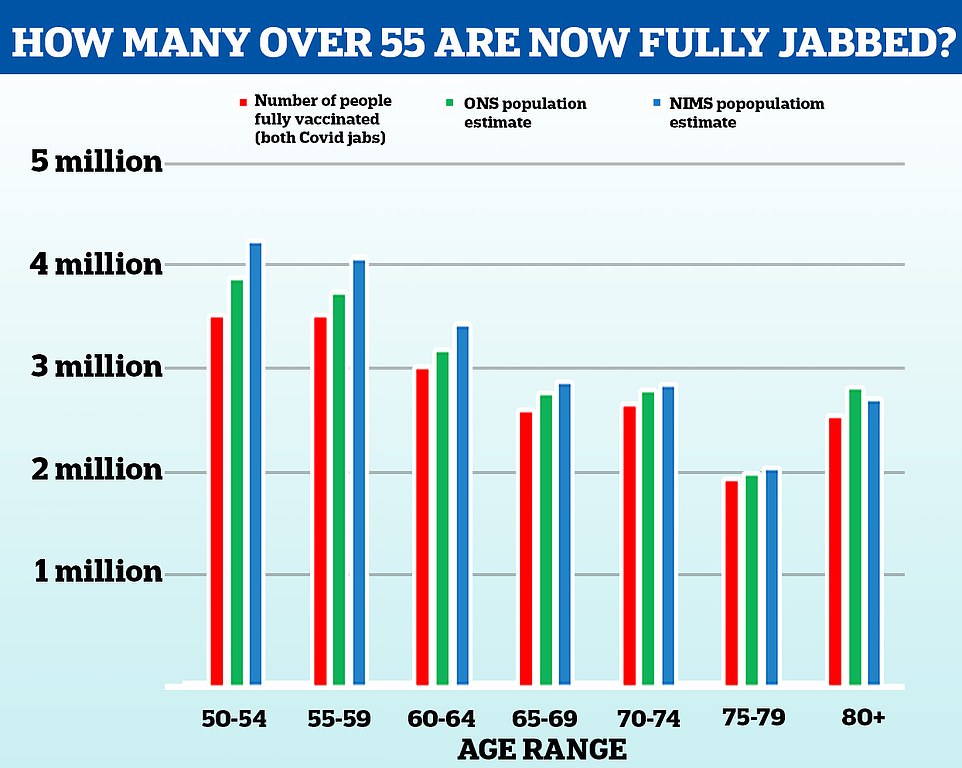
While most over 50s have got both their Covid vaccines, about 2million, or roughly one in 10 over 50s in England are completely unvaccinated as the country heads towards winter
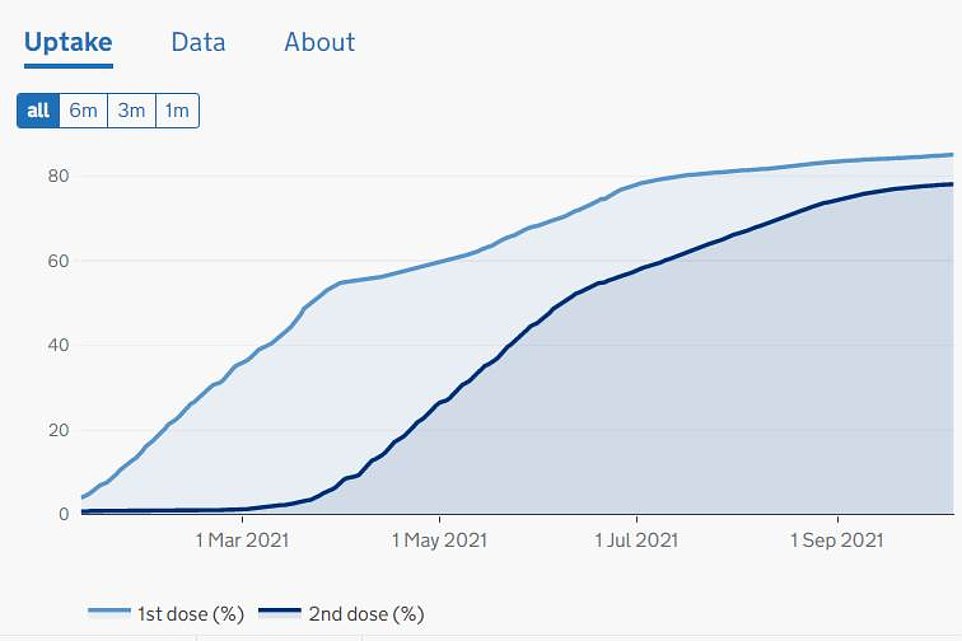
This graph shows the number of people in England who received their first and second Covid vaccination as a percentage of the population
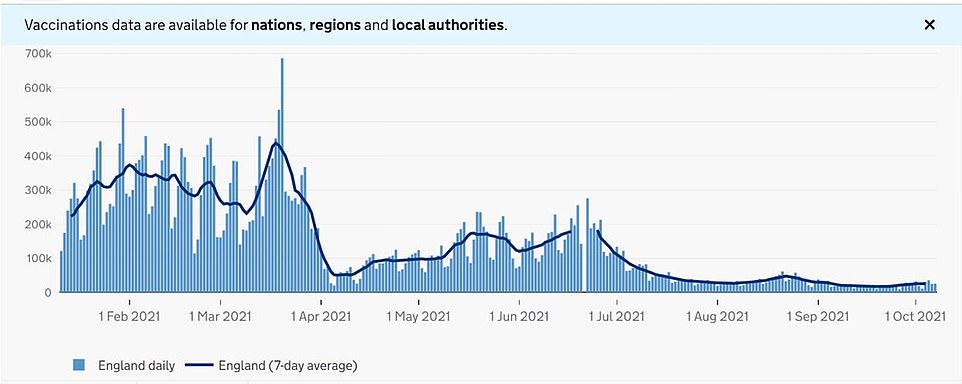
This graph shows the number of first doses of the Covid vaccine administered in England. There was a rise in vaccines in March, when all over 50s were invited to get their first jab
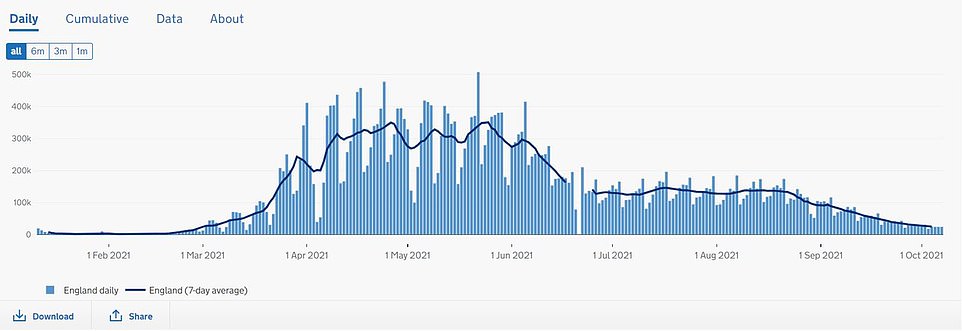
This graph shows the number of second doses of the Covid vaccine delivered in England. Numbers of second jabs have remained relatively stable since June but started to drop off in September.
The latest figures on Covid vaccinations for England show that as of October 7, 20.3 million over 50s in England had received their first jab.
This leaves between nearly 950,000 and about 1.9 million people over the age of 50 in England who have not yet received one Covid jab, with NHS England using two different population estimates to measure vaccination uptake.
This equates to roughly one in 10 or 20, of this demographic depending on either Office of National Statistics (ONS) or National Immunisation Management System (NIMS) population estimates.
NHS England uses two population estimates, one is a ONS population estimate from mid-2020 and the other is the NIMS.
The ONS data set is based on population census from 2011 so is subject to a degree of uncertainty where as the NIMS is based on people registered with the NHS and is updated weekly.
However the NHS states NIMS likely overestimates population and therefore underestimate vaccine uptake. Death registration data is subject to a reporting lag some people registered may no longer live in England.
Covid vaccine bookings for all people over 50-years-old have been available since March 17, with older people and those with medical conditions that make them more vulnerable to a Covid infection being offered the vaccine before this.
As a general rule, the older the individual the more likely they are to suffer a serious Covid infection if they catch the virus.
Some experts were shocked that so many people over the age of 50 had not come forward for their vaccine in the subsequent six months.
Professor Anna Whittaker an expert in vaccines and behavioural medicine from the University of Stirling said conspiracy theories, like those spread on social media, could be to blame.
‘It is surprising that so many have not had their first Covid vaccine, but this is not helped by the circulation of conspiracy theories and risks making some people feel it would be dangerous to have the vaccine,’ she said.
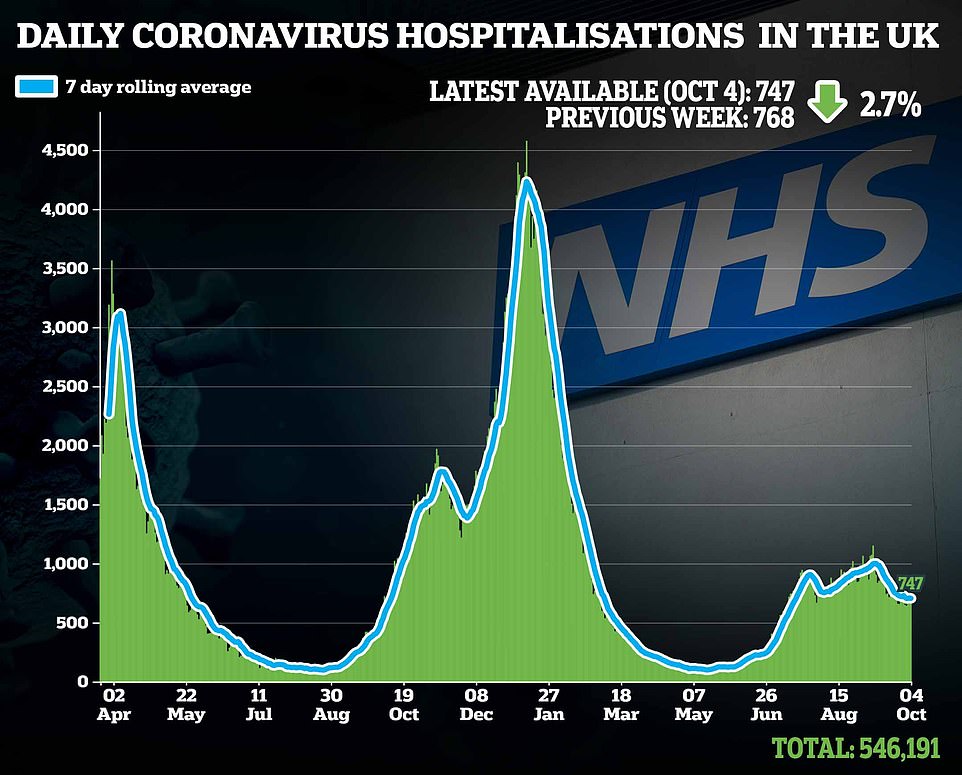
After a rise in September the number of hospitalisations due to Covid infection has begun to fall
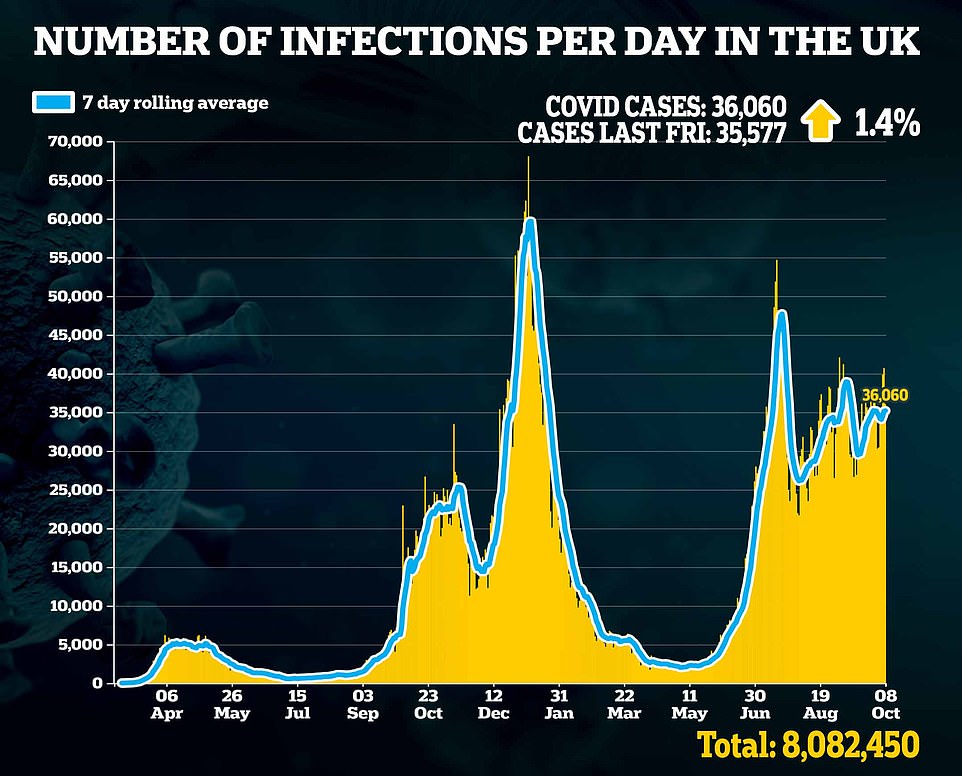
After dropping in September Covid infections per day have begun to rise again but are still far off the peak seen last winter
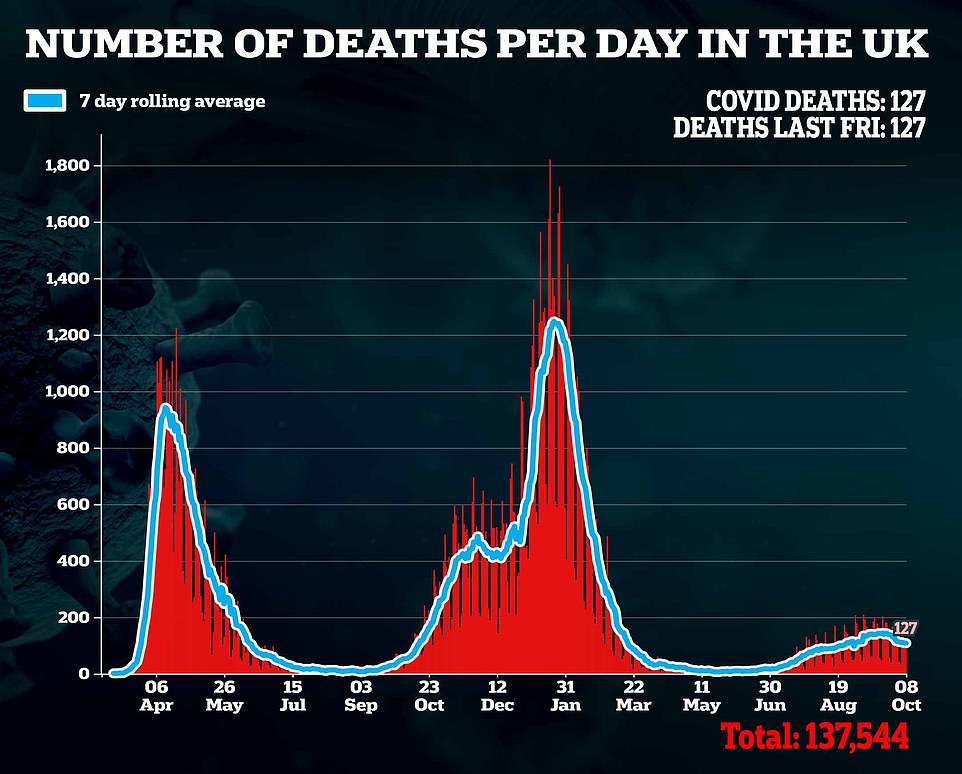
Deaths from Covid appear to have plateaued since rising since the end of June with 127 reported in latest data release
‘I think they have concerns about safety and side effects due to sensationalism in the media.’
The risk of blood clots from the AstraZeneca vaccine was widely publicised when it came to light earlier this year.
But subsequent research from Oxford University later revealed that the chance of getting a blood clot from the Covid virus was much higher than the vaccine meaning it still offered protection.
However the discovery did lead to the AstraZeneca jab being restricted for use in the under 40s who are less at risk of Covid than older people.
Professor Whittaker said all over 50s should consider getting the Covid vaccine, if they had not done so already.
‘I would encourage over 50s to get the vaccine given the increased risk of having a poorer immune response in older people, thus being less able to combat the disease if they contract it,’ she said.
‘Side-effects following the vaccine might be unpleasant but are a good indicator that your body’s immune system is responding in the way it should.’
She added that getting vaccinated could be crucial with the country dealing with both both flu and Covid this season, compared to the last year’s winter lockdown.
‘I would certainly encourage this group to get vaccinated ASAP given we are heading into Winter with flu circulating also,’ she said.
‘This isn’t too late as the body starts producing antibodies within a few days of receiving a vaccine.’
University of Oxford expert on vaccination ethics Dr Maximilian Kiener with many over-50s might be mistakenly thinking the pandemic is over due to the relaxing of lockdown restrictions in July.
‘Many people might think the pandemic is basically over and there’s no need to get the jab anymore. But that’s wrong,’ he said.
‘We need to keep going and convince as many people as possible to get the vaccine.’
Dr Kiener said some people might think that a serious Covid infection could never happen to them, but medics should do their utmost to inform patients of this potential reality.
‘It is critical that GPs inform their patients very explicitly about the risks and make salient what having a serious infection involves,’
‘People might need to see realistic pictures or even videos of other people who are like them and became seriously ill.’
Another suggestion of Dr Kiener’s was positive reinforcement and said the UK could learn from our neighbours in this regard.
‘We need to tell people how many others have already got the jab and benefitted from it,’ he said.
‘And we can certainly learn from French campaigns that addressed people very directly, e.g. when one poster showed a kissing couple and stated that the vaccine could have ‘desirable side effects’.’
But if all this fails Dr Kiener said the nation must respect these people’s decision to not get the vaccine.
‘Vaccination is still a medical procedure and requires voluntary consent,’ he said.
‘Otherwise, vaccination would violate a person’s right to bodily integrity, a right that we should be very reluctant to compromise.’
NHS England was contacted on if any special measures were underway to reach out to older unvaccinated people, but the organisation did not respond by deadline.
The latest vaccine data comes as MailOnline revealed that millions on people eligible for Covid booster vaccine have not taken up the offer of a fresh jab.
Up to 5 million people in England currently qualify for a booster jab but only around a third have come forward for one.
It comes after a top Government scientific advisor said he wanted Britain to be ‘more aggressive’ with the rollout to limit the damage of a winter wave of cases.
A total of 1.7million people in England have received a booster since the programme was signed off last month.
Invites are only being sent out to those who received their second dose at least six months ago because that is the ‘sweet spot’ for immunity.
For this reason, the rollout was always expected to be slower than the initial jab blitz, which at its peak saw 800,000 people vaccinated per day.
But official figures show 4.9m people finished their two-dose vaccination schedule six months ago, with the majority meeting the criteria making them eligible for a top-up now.
About 400,000 of the people jabbed half a year ago were immunocompromised and are receiving their third dose on a slightly different schedule. And many people who were vaccinated first originally were elderly and may have passed away in the past six months.
But even when these are discounted, it still leaves millions of eligible and vulnerable people with subpar immunity.
Earlier this week, Professor Neil Ferguson, a crucial member of the Government’s scientific body SAGE, suggested the booster scheme was going too slowly.
